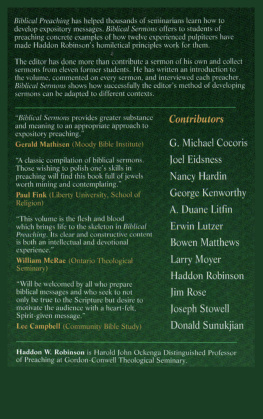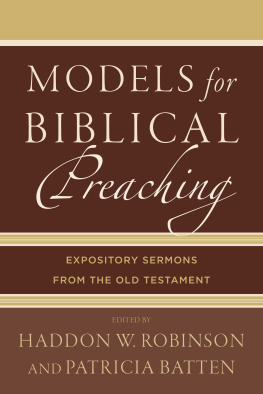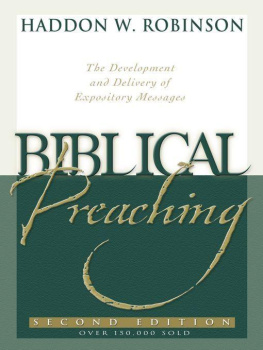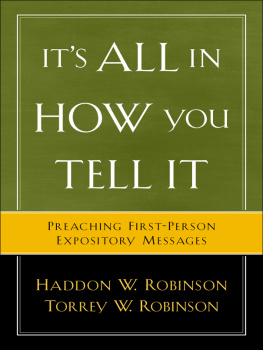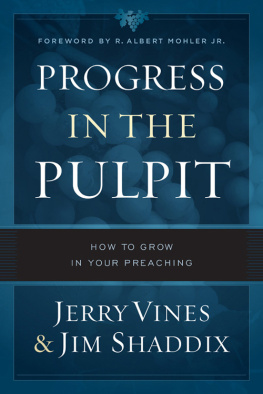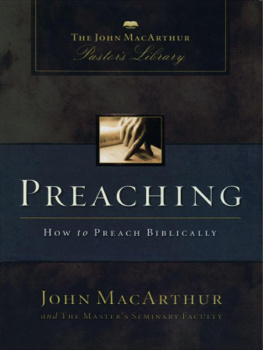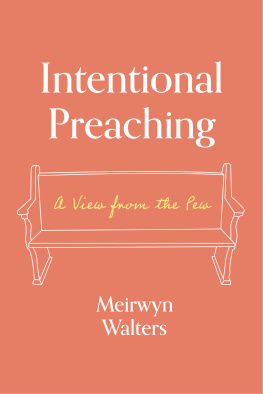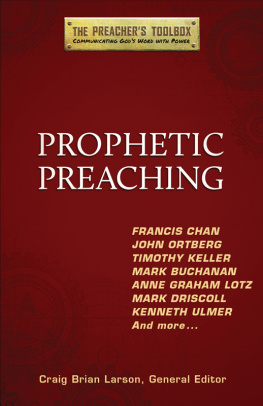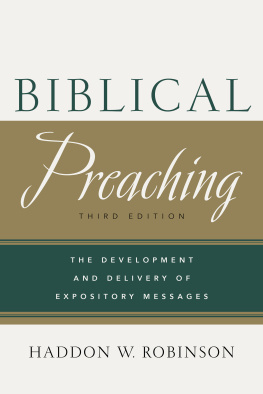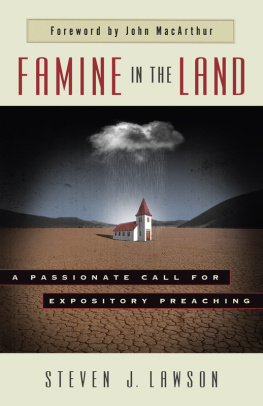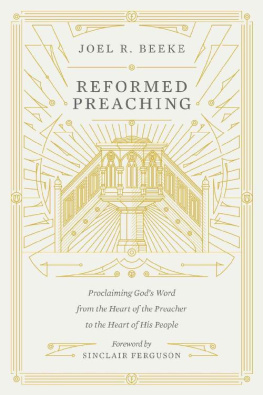Haddon W. Robinson - Biblical Sermons: How Twelve Preachers Apply the Principles of Biblical Preaching
Here you can read online Haddon W. Robinson - Biblical Sermons: How Twelve Preachers Apply the Principles of Biblical Preaching full text of the book (entire story) in english for free. Download pdf and epub, get meaning, cover and reviews about this ebook. year: 1997, publisher: Baker Publishing Group, genre: Religion. Description of the work, (preface) as well as reviews are available. Best literature library LitArk.com created for fans of good reading and offers a wide selection of genres:
Romance novel
Science fiction
Adventure
Detective
Science
History
Home and family
Prose
Art
Politics
Computer
Non-fiction
Religion
Business
Children
Humor
Choose a favorite category and find really read worthwhile books. Enjoy immersion in the world of imagination, feel the emotions of the characters or learn something new for yourself, make an fascinating discovery.
- Book:Biblical Sermons: How Twelve Preachers Apply the Principles of Biblical Preaching
- Author:
- Publisher:Baker Publishing Group
- Genre:
- Year:1997
- Rating:5 / 5
- Favourites:Add to favourites
- Your mark:
- 100
- 1
- 2
- 3
- 4
- 5
Biblical Sermons: How Twelve Preachers Apply the Principles of Biblical Preaching: summary, description and annotation
We offer to read an annotation, description, summary or preface (depends on what the author of the book "Biblical Sermons: How Twelve Preachers Apply the Principles of Biblical Preaching" wrote himself). If you haven't found the necessary information about the book — write in the comments, we will try to find it.
Biblical Sermons: How Twelve Preachers Apply the Principles of Biblical Preaching — read online for free the complete book (whole text) full work
Below is the text of the book, divided by pages. System saving the place of the last page read, allows you to conveniently read the book "Biblical Sermons: How Twelve Preachers Apply the Principles of Biblical Preaching" online for free, without having to search again every time where you left off. Put a bookmark, and you can go to the page where you finished reading at any time.
Font size:
Interval:
Bookmark:

1989 by Baker Publishing Group
Published by Baker Books
a division of Baker Publishing Group
P.O. Box 6287, Grand Rapids, MI 49516-6287
www.bakerbooks.com
Ebook edition created 2012
All rights reserved. No part of this publication may be reproduced, stored in a retrieval system, or transmitted in any form or by any meansfor example, electronic, photocopy, recordingwithout the prior written permission of the publisher. The only exception is brief quotations in printed reviews.
ISBN 978-1-4412-3159-8
Library of Congress Cataloging-in-Publication Data is on file at the Library of Congress, Washington, DC.
Except where stated, Scripture quotations are taken from the Holy Bible, New International Version. NIV. Copyright 1973, 1978, 1984 by Biblica, Inc. Used by permission of Zondervan. All rights reserved worldwide. www.zondervan.com
Contents
1. A Case Study in Temptation,
Genesis 3:16
Haddon W. Robinson
2. Thou Shalt Not Commit Adultery,
Exodus 20:14
Erwin W. Lutzer
3. The Big Valley, 1 Samuel 17:151
James O. Rose
4. A Night in Persia, Esther
Donald Sunukjian
5. Riding the Wind of God,
Psalm 127
Duane Litfin
6. He Who Has Ears to Hear...,
Jeremiah 1
Bo Matthews
7. For Wait Watchers Only!
Luke 1:525
George Kenworthy
8. Who Cares? Luke 15
Joseph M. Stowell
9. A Woman Who Came a Stones Throw from Death, John 8:112
Nancy Hardin
10. How to Stand Perfect in the Sight of God, Romans 4:5
Larry Moyer
11. When Life Deals You a Lemon,
Make a Lemonade, James
Michael Cocoris
12. Lament for the City of Man,
Revelation 1718
Joel Eidsness
Introduction
Several years ago I took a course in geology. More accurately, the course took me. Our class met for three lectures each week plus a lab session. The professor lectured about rocks and rock formations, and in the assigned reading we were provided with descriptions of rocks and photographs of what they looked like. On the examinations based on the lectures and the textbook, I received high gradeswhich demonstrates only that professional students learn how to listen and read.
It was the lab sessions that did me in! There we faced real rocks. We were required to identify the igneous, sedimentary, and metamorphic rocks and to pick out the silicates, carbonates, and sulphides as well. I labeled four out of ten correctly, a percentage slightly worse than could be achieved by flipping a coin. Obviously, I had rocks in my head, but that did not transfer to the rocks I held in my hand!
With that geology class still an uncomfortable memory, I empathized with the reactions of a few of the homiletics professors using my book Biblical Preaching as a text. Students need to see the principles in practice, they wrote. If theres anyone out there who practices what you teach, have them provide some sermons as examples.
As a result of such prodding, I contacted several former students who, for better or worse, carry the smudge of my thumbprint upon them, and I asked for a specimen sermon. None of these preachers jumped at the opportunity. A couple of them protested that any sermons they provided would only end up as bad examples. Their modesty is both commendable and understandable. While all of these ministers have been preaching for over a decade and have reputations as effective communicators, they dont consider themselves pulpit masters. Therefore, something needs to be said in their defense.
First, this book is not an anthology of The Greatest Sermons of the Twentieth Century. In fact, these sermons do not necessarily represent the best work of these preachers. All of these messages were forged out of the demanding routines of busy ministries. Most of the contributors serve as active pastors. One travels as an evangelist. I put in time as a seminary president. One, a woman, is regularly involved in womens conferences. All would vote for a twenty-eight-hour day and an eight-day week. While the sermons may have received a bit more polish than usual, each smacks of the ordinary rather than the extraordinary and represents what preaching done on a regular basis looks like. Yet, the sermons also demonstrate that ministers living with the pressures of demanding schedules and the tensions of modern society can still preach helpful biblical messages when they meet their congregations on Sunday.
Second, sermons are designed to be heardnot read. A sermon on the page is like a figure in a wax museum. The form stands there, but the flash of the eye, the language of the face, the sweep of the hand, the range of the voice, the life and breath are missing. Sermons are never preached in cold blood. All of these ministers sound better than their printed sermons. What is more, the stronger the preacher, the greater the contrast between his manuscript and his spoken word. Yet, printed sermons do have value. Admittedly, a biology student takes the life of the frog when she dissects it in the laboratory, but she studies the parts, nonetheless, to discover what makes a frog jump. A student of preaching can discover in the sermon on a page what might never emerge listening to the same sermon from the pulpit. While dissecting a written sermon omits the important ingredient of the word spoken, it remains an effective way to analyze how sermons are put together.
Third, while all of the contributors have been my students, some practice the methodology that I have taught more extensively than others. All endorse my approach and recommend it, but as John Nicholls Booth noted in the introduction to his little book, The Quest for Preaching Power : Rules for preaching are simply the scaffolding used during the construction period. In the building years of ones ministry, sermons must be erected within this protecting, guiding structure. Later the form to follow becomes ingrained and the scaffolding may be torn down, completely forgotten. None of these preachers is a clone of mine. While they have accepted my philosophy of homiletics, they have benefited from the counsel of others and from experience. Shaped by their reading and their own background and pilgrimage, their preaching reaches beyond any static rules to reflect their own personalities. While no good preacher outgrows the principles and devices of the preaching art, as a skilled, experienced craftsman, each has developed beyond them.
The purpose of this book, therefore, is to demonstrate how the approach to homiletics in Biblical Preaching is worked out in sermons of several experienced communicators. Since much of homiletics is more caught than taught, these ministers show us a specimen of the work they have done and thus let us glimpse how they work.
Many different pressures work on a minister as he or she crafts a sermon. First, the biblical material exerts its force. The sermons in this book expound texts from Genesis to Revelation. The collection embraces an impressive variety of biblical genrenarrative, poetry, history, law, parables, letters, and apocalyptic literature. The Bible not only supplies the central idea and supporting content for each lesson, but usually dictates its form as well. Had these preachers based their sermons on another biblical passage, each might have approached the text in a completely different manner.
A second factor present in the development of a sermon is the audience. Sermons, unlike essays, are not addressed to whom it may concern; they are delivered to men and women sitting at a certain time of day, usually on Sunday in a building with a zip code. Since these congregations exist in the latter half of the twentieth century, they possess much in common. Although situated in different parts of the United States and carrying a variety of denominational labels, they represent predominantly upper-working-class and middle-class churches. All are strongly evangelical. Yet, each congregation, while affected by the winds which sweep across American society, is also unique in its own temptations, pain, and frustrations. When the pastor stands to preach, it is to that particular people he must speak. The congregation has been with him in the study during the preparation of the message. Each preacher has invested time in the passage, often reading it in the original languages. He has brought down from the shelf the reference books and consulted the commentaries. While each minister teaches his congregation the Bible, he does not serve as their professor but as their pastor. His sanctuary is not a seminary, and his audience will not be expected to pass an examination on the content. As Ruskin said, he has thirty minutes to raise the dead and to persuade his hearers to let the Bible into their lives. Each minister wants to be faithful to the text and to scholarly discussions about the passage, but, above all, he desires to be faithful to his people. Sermons, therefore, are more like thoughtful conversations than scholarly lectures.
Next pageFont size:
Interval:
Bookmark:
Similar books «Biblical Sermons: How Twelve Preachers Apply the Principles of Biblical Preaching»
Look at similar books to Biblical Sermons: How Twelve Preachers Apply the Principles of Biblical Preaching. We have selected literature similar in name and meaning in the hope of providing readers with more options to find new, interesting, not yet read works.
Discussion, reviews of the book Biblical Sermons: How Twelve Preachers Apply the Principles of Biblical Preaching and just readers' own opinions. Leave your comments, write what you think about the work, its meaning or the main characters. Specify what exactly you liked and what you didn't like, and why you think so.

